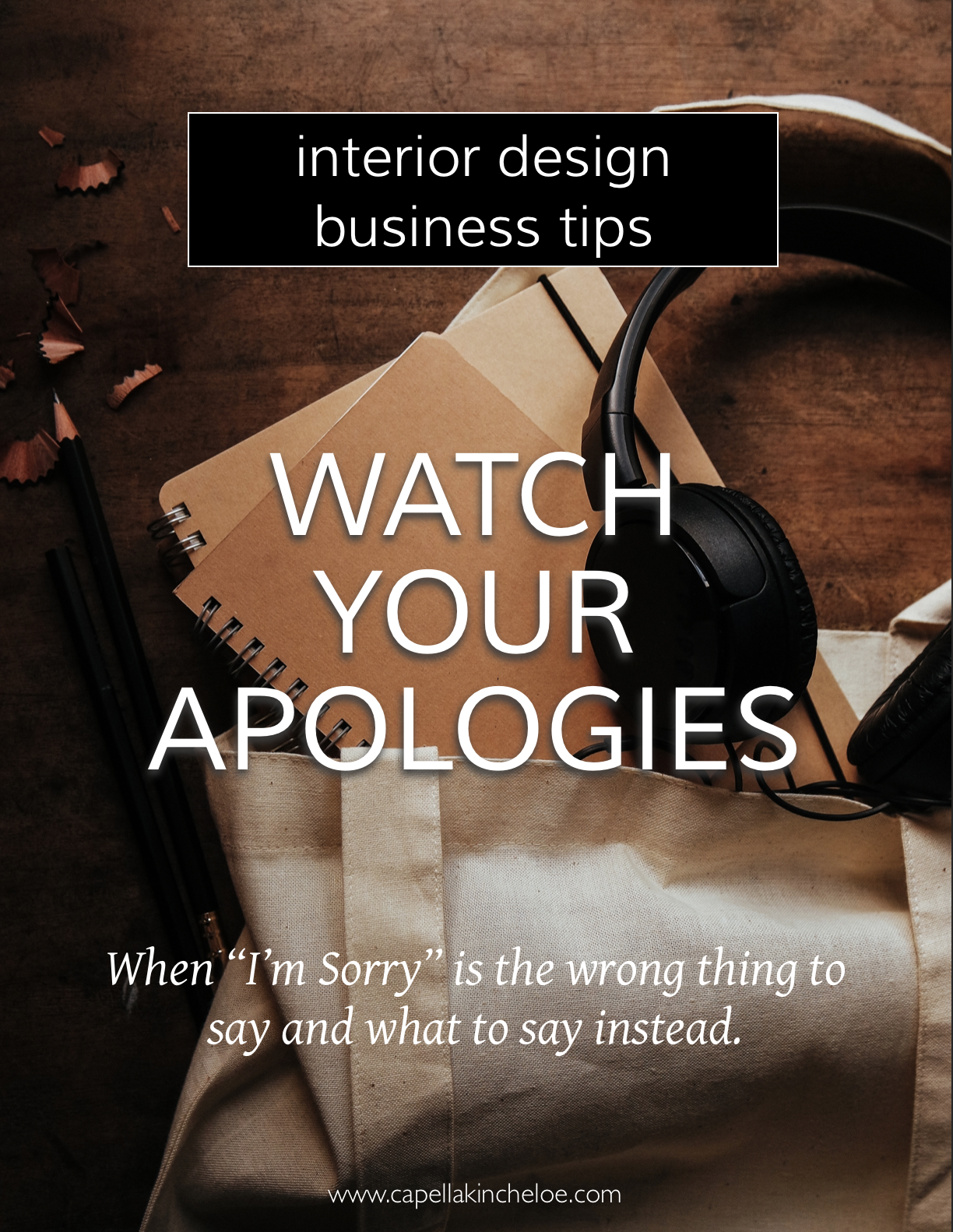Watch Your Apologies
Do YOU Over-Apologize?
You’ve probably heard that we apologize too much. We often apologize when we shouldn’t or when it’s not necessary or authentic.
Maybe you apologize to the chair when you bump into it. Maybe you apologize to your cat when you move it off your keyboard. Perhaps you apologize in your automated out-of-office replies. Maybe you’re saying “sorry” in most of your outbound emails.
I’m sorry I didn’t get back to you yesterday.
I’m sorry the faucet is backordered.
I’m sorry that the electrician is late.
I am sorry that’s not in the budget.
I’m sorry (you took so long to pay for your order that) it won’t be in on time.
When An Apology Isn’t An Apology
We all have become sensitive to over-apologies and can recognize when an apology isn’t really an apology, but a reflex, a blame-reversal, appeasement, or an assertion. (1)
Many times apologies aren’t for the recipient, but for the giver who is looking for relief - essentially someone to say, “It’s okay.” Essentially, a selfish sorry.
Apologizing can actually put us and our clients, vendors, or prospects on the defense. We’ve been taught that “sorry” can soften the blow, but it can actually make them feel worse. They may feel worse about what you’re saying, despite the added word “sorry” because they can tell the difference between a meaningful apology and the other kinds. They may feel worse because they don’t want to be the one to say “it’s okay.” Or maybe because it highlights a problem or issue in a way that it wasn’t before. And maybe the problem didn’t exist in their mind until you drew attention to it.
Canadian sociologist Maja Jovanovic says that excessive “sorrys” can make us less confident and more timid. (2) Not a good look for a business owner.
What to Say Instead
This past summer, when I sent my weekly newsletters, I would often get the auto-replies that said something like this: Please note that the office will be closed beginning Monday, July 1st through Friday, July 12th for Summer Vacation. We will respond to emails as soon as the office has reopened. Sorry for any inconvenience this may cause.
I don’t think that last sentence should be in there. This is a reflexive apology, a preemptive apology (before any complaint has been lodged), an attempt to appease someone who may feel inconvenienced, and also an assertion. It’s an assertion because you’re asserting your requirement to go on vacation/not be chained to your email. Plus, some people may not feel inconvenienced until you mention it - the power of suggestion is strong. Finally, it can make us less confident and more timid. A lot is wrapped up in that little sentence.
I suggest that instead of “Sorry for any inconvenience this may cause” you say “Thank you for your patience.”
Now, let’s revisit the apologies that started this:
I’m sorry I didn’t get back to you yesterday. → Thank you for waiting while I gathered the necessary information to get back to you.
I’m sorry the faucet is backordered. → I just received word that the faucet is backordered. I suggest that we purchase an inexpensive temporary faucet that can be replaced when the one you want comes in.
I’m sorry that the electrician is late. → I know it’s frustrating when contractors aren’t on time, sometimes things happen on jobs that are out of our control and he probably doesn’t want to leave those clients in a bad situation, I’ll speak with him about better communication moving forward.
I am sorry that’s not in the budget. → That doesn’t fit with the budget you provided. Would you like to reallocate funds to make it work?
I’m sorry (you took so long to pay for your order that) it won’t be in on time. → As that order has a 16-week lead time, it won’t make it here before your installation date, would you like to move forward with the original selection or find an alternative?
Ultimately, you want to use “sorry” sparingly and for situations that only an authentic apology will do. Replace apologies with “thank yous” as a way of taking control of the situation. If necessary, acknowledge feelings to show compassion. Explain, but don’t make excuses. Show that you’re focused on the solution, not on the problem.
Avoid Unfortunately Too
While writing the above reframes, I had keep myself from writing “unfortunately” (as in Unfortunately, the faucet is backordered.) Bad news always follows “unfortunately” and you don’t want to put people immediately on the defense or bracing themselves for impact. I suggest you stop using “unfortunately” in all communications.
Many times “unfortunately'“ can sound snarky or condescending and leads with the negative, people know to expect something bad when “unfortunately” is around. So please, for the sake of your clients and business avoid '“unfortunately” too.
And if you’re wondering, while writing this article, I couldn’t help but think of this.
Resources:
(1) https://psychcentral.com/blog/what-you-need-to-know-about-apologizing-way-too-much/
(2) https://ideas.ted.com/sorry-to-bother-you-but-do-you-say-sorry-too-much-what-to-say-instead/




